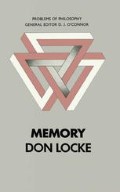Abstract
If we go back to the “obvious” account of memory sketched at the very beginning of chapter 1, we can see that it incorporates three basic claims, all of them central to both the Representative and the Realist theories:
-
1)
Remembering is an occurrence, something that happens, more particularly something we do;
-
2)
This occurrence consists in a mental experience, involving the having of mental images, whatever they may be;
-
3)
It is because we have these experiences, these memory-images, that we know various facts “from memory,” i.e., memory-knowledge is knowledge based on or derived from the memory-experience or memory-image.
In the recent discussion of the topic, these three central claims have all been questioned and virtually abandoned. Certainly, we must examine them more closely than we have so far.
Preview
Unable to display preview. Download preview PDF.
Copyright information
© 1971 Don Locke
About this chapter
Cite this chapter
Locke, D. (1971). The Contemporary Approach. In: Memory. Problems of Philosophy. Palgrave, London. https://doi.org/10.1007/978-1-349-00702-8_3
Download citation
DOI: https://doi.org/10.1007/978-1-349-00702-8_3
Publisher Name: Palgrave, London
Print ISBN: 978-1-349-00704-2
Online ISBN: 978-1-349-00702-8
eBook Packages: Palgrave Religion & Philosophy CollectionPhilosophy and Religion (R0)

